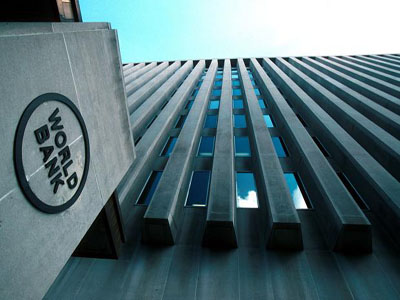 It is far from one straight answer on the question of the desirability or otherwise of the Federal Government getting a $3.5 billion loan from the World Bank and African Development Bank (AfDB) . Some Nigerians have approved the move while others have considered it as a threat to the economic independence of the country.
It is far from one straight answer on the question of the desirability or otherwise of the Federal Government getting a $3.5 billion loan from the World Bank and African Development Bank (AfDB) . Some Nigerians have approved the move while others have considered it as a threat to the economic independence of the country.
The government plans to take $2.5 billion from the World Bank and $1 billion from the AfDB . The fear over the deal is not necessarily about the debt, but the choice of the creditors, particularly the World Bank, which may prescribe conditionalities that would be inimical to the economy and citizens.
Nigeria’s quest for loans has become necessary due to the persistent fall in the price of crude oil, which has resulted in the fall in the nation’s revenue profile, with consequent widened deficit in the 2016 budget plans.
With the continuous fall in the price of crude oil below $30 per barrel, the expected budget deficit has been estimated around half of the total budget package by analysts.
The Guardian learnt that the move was part of efforts to save the economy and provide buffers for the volatile exchange rate of the naira, besides filling the growing gap in the budget proposal.
The concern is heightened by the fact that under World Bank rules, its loan would be subject to an International Monetary Fund (IMF) endorsement of the government’s economic policies.
Already, the IMF has listed Nigeria as a “struggling” economy, with some misgivings about the current monetary policies, particularly the capital controls in the foreign exchange market.
IMF’s endorsement would mean a renewed pressure on the Central Bank of Nigeria to adjust the rules and the fear is more about the much-resisted devaluation of the naira.
According to Dr. Austin Nweze of the Pan Atlantic University, borrowing is a global issue, because no government is without debt, but the choice of World Bank remains a source of concern.
“Granted, it has the money, but the conditionalities would always present the bitter pills of the relationship. It is now left for us to either accept it or not. Government should have opted for a moderate budget given the economic situation it met on ground rather than the uncertainty to which it is directing the economy now,” he said.
While acknowledging that the institution would not fund corruption, he noted that its rules were rigorous sometimes and they had not favoured many countries that had dealt with it.
A retired director of one of the federal ministries, Keneth Ubong Bassey, said the loan moves would further enslave the country, as government would have no option but to do their bidding, part of which would be the devaluation of the currency.
“Nigeria has been independent since 1960 and we should take our destiny in our hands. We should take our decisions by ourselves, instead of taking the loans and falling back to the point where we must devalue our naira, the government should slash the bogus budget from the current N6.08 trillion to meet the present realities.
“Why should we raise our budget profile so high when we have little resources to fund it? To me, this would further bring poverty to the people instead of increasing their standard of living,” he said.
A civil society activist and analyst, Jide Ojo, said he believed that the conditions, which would be unveiled later this week, would be better than any other option for the government to broker the deal at last.
He expressed concern over the implementation, which has been the usual challenge for the country, alleging that even the existing budget proposal was still filled with frivolities that would create further suspicion.
An analyst and chartered accountant with Geometric Power Company, Agara Iworah, however differed, saying there was nothing too bad about taking a loan facility, which must depend on what the government would use it to achieve.
“But I would advise government to look inwards, reduce all overhead expenditures and allowances meant for political office holders,” he said.
Iworah also called on the government to go ahead with the total removal of the fuel subsidy, noting that the country could no longer afford to pay for fuel subsidy.
“This is the right time for the government to totally remove the fuel subsidy and use the money to fund our budget. It must swallow its pride, subsidy removal is the answer, even better than the borrowing,” he said.
Also, a social analyst and politician from Abia State, Akiri Osisam Ede, said the loan move from World Bank should not be the first option, warning that the agreement must be scrutinised properly before sealing the deal.
“If the loan is for the funding of the budget, which is yet to be passed by the National Assembly, it may put Nigeria in a very difficult situation knowing what the World Bank loans are, especially as they usually come with conditionalities- the devaluation of the naira.
“We are presently facing serious economic challenges, so if we take the loan, the conditionalities will further bring hardship on innocent Nigerians. We should look inwards and the provisions as provided in the current budget should be strictly reviewed,” he noted.







